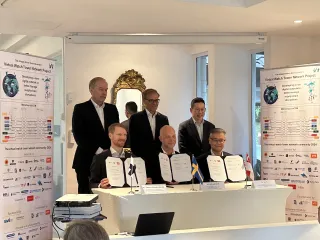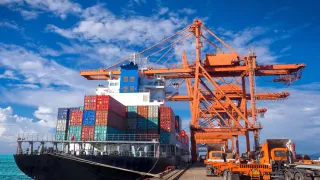VTT, together with Sweden's RISE and Singapore's A*STAR’s IHPC, has signed a MOU to launch the Virtual Watch Tower (VWT) orchestrator. This new digital tool aims to enhance resiliency across international trade corridors and supply chain networks by addressing inefficiencies and disruptions through enhanced transparency and real-time data. Additionally, it focuses on supporting effective carbon footprint management within the shipping industry.
The Virtual Watch Tower (VWT) is a new digital orchestrator built on advanced AI integration to improve maritime transport efficiencies and build more resilient chains while helping to decarbonise the maritime industry's supply chain and logistics. The Minimum Viable Product (MVP) of VWT was presented for the first time at the Singapore Maritime Week (SMW) 2024. Dubbed the Virtual Watch Tower (VWT), this technology-driven initiative will tackle shared challenges along corridors and international supply chain and logistics networks.
VWT is a ground-breaking effort by research institutes RISE (Sweden), VTT (Finland), and A*STAR's IHPC (Singapore), financed by national funders SMI and Vinnova and supported by technology companies Transporeon, Marine Benchmark, YLOAD, and Fujitsu. Additionally, Scania, Here Technologies, Einride, Chalmers, and the University of Gothenburg that are co-shaping digital solutions and community governance.
Improved situational awareness manages supply chain risks
“Trusted data sharing processes are essential. Disruptions in the supply chain may compound the challenges in the ports, to which all stakeholders should be prepared to respond. Global trade is projected to grow by 250% by 2050, according to UNCTAD review of Maritime Transport 2023, which highlights the need to improve efficiency and to increase the risk of disruption. This calls for resilience to overcome unexpected changes in the transportation chain. VTT has extensive experience in applied research and is committed to solving global systemic challenges. VWT is an important contributor to solving these challenges”, says Research Team Leader Teemu Manderbacka from VTT.
VWT's primary goal is to drive on-demand collaboration around specific shipments based on data sharing through a push mechanism, with complete data control staying with the VWT community members. The objective is to offer situational awareness of essential transport and logistics assets, such as cargo and containers. VWT aims to help facilitate collaborative decision-making among stakeholders based on improved data insights. This will generate logistics control towers for end-to-end operational logistics and supply chain monitoring and foster collaboration and intelligent resilience among global supply chain actors by sharing private data enriched by public data.
"Transport is part of the shippers' Scope 3, which typically accounts for 90% of their emissions. VWT aims to become the primary data-sharing community, allowing for more accurate CO2e calculations. This is an enormous challenge to everyone in the end-to-end supply chain who must contribute primary data for this to work – from ports to trucks and terminal operators. Need to calculate their emissions to comply with regulations, reduce their carbon footprint, and help shippers calculate their Scope 3 emissions," explains Mikael Lind, RISE, Research Institute of Sweden.

Stronger maritime links between Nordic countries and Singapore
The VWT initiative was born out of a call for action from the shipping industry. Global supply chains have been tremendously disrupted in recent years, with reliability in ocean shipping plummeting from around 70 % pre-pandemic to 30 %. The lack of data visibility exacerbates these disruptions and inadequate reporting of port backlogs, inclement weather, and other disruptions.
Over the past year, VWT members joined forces, using advanced AI integration, real-time data analysis, and enhanced supply chain visibility to develop a solution that addresses these issues and improves risk management capabilities. The result is a terminal-centric initiative driven by cargo owners. Tower-controlled, the data pushed is governed by a commonly accepted code where no central database is required, nor is central infrastructure or control needed.
Shipping trade corridors between Nordic countries and Singapore are strategically crucial in strengthening geopolitical ties between the Nordic region and Southeast Asia. Singapore's position as a prominent maritime hub enhances the efficiency of trade operations, making it an ideal gateway for Nordic exports to Asian markets and beyond.
Additionally, the collaboration between Nordic countries and Singapore in the maritime sector extends beyond trade to encompass technology exchange and sustainability efforts. The VWT initiative is built on the technological expertise of Nordic countries and Singapore's status as a global innovation hub to drive advancements in maritime transportation, logistics, and sustainable shipping practices to not only support resilience and competitiveness but invite industry players to contribute to international efforts to address environmental challenges and promote sustainable development.
A VWT entity to be launched
As a next step, VWT will explore to create a physical neutral legal entity to serve as a fiduciary for its community members. Furthering its role as an ecosystem orchestrator, the entity will have control of data collection and use, and community members can influence the orchestration rules. VWT, in its role as fiduciary, assures that data use follows those rules. This will mark the beginning of an open-source development of an innovative solution to better deal with disruptions and carbon emissions in global supply chains.
For more information:
Desiree Mohindra
[email protected]
Join the VWT digital community
Companies interested aren't confined to being users — there are opportunities to co-create within the VWT framework. At Singapore Maritime Week, VWT calls on maritime leaders, technology providers and software developers to join and co-create within the community's ambition to drive significant change in the supply chain and logistics industry, bringing substantial improvements in disruption and carbon footprint management. Even as the industry competes in the sales and sourcing markets, members can collectively shape this new standard tool for collective use, augmenting the community's ability to deal with economic constraints and societal challenges like supply chain disruptions and GHG emissions.





